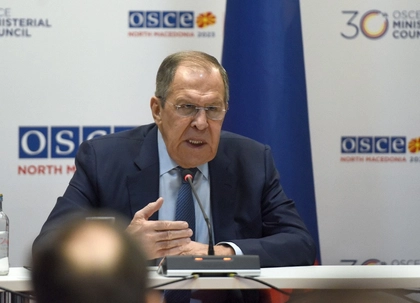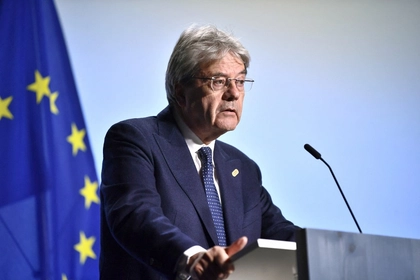As Russia continues to use its veto power over the Organization for Security and Co-operation in Europe (OSCE) to block any major decisions from the body set up to promote human rights, peace, and democracy in the Northern Hemisphere – Ukraine would like Russia out.
The situation has drawn comparison to Russia’s position in the UN, where, as one of the five permanent members of the Security Council, it holds veto power as the designated successor to the Soviet Union – and has been using that power to great effect.
JOIN US ON TELEGRAM
Follow our coverage of the war on the @Kyivpost_official.
While making changes to the UN rules would likely be a higher mountain to climb and there are still no mechanisms in place to kick out a member state in either case, representatives of Ukraine’s PA delegation hope they can make more headway at the OSCE, if Kyiv-made amendments go forward that are intended to break the Kremlin’s stranglehold.
For its part, Moscow’s top diplomat, despite attending the last OSCE meeting, claimed “indifference” to the OSCE’s fate.
“The OSCE is being turned into an appendage of NATO and the EU,” Foreign Minister Sergei Lavrov said, whose presence at the Nov. 30 – Dec. 1 meeting in Skopje, North Macedonia triggered boycotts by Latvian, Lithuanian, Estonian, Polish and Romanian foreign ministries. “Let's face it, the organization is on the edge of the abyss. A simple question arises – does it make sense to invest forces in its revival?”

Moscow Prime Suspect for Sabotage Aimed at Disrupting Olympic Games
Despite US Secretary of State Antony Blinken’s not meeting with Lavrov in North Macedonia, the US sees Russia’s membership in the OSCE as a still-viable line of communication, Ukraine’s PA delegates said.
“Our American colleagues are of the opinion that it is necessary to preserve two platforms for contacts with the Russian Federation – the UN and the OSCE. Therefore, in fact, the prospect of even suspending the powers of Russia is still in question,” Mykyta Poturaiev, the head of Ukraine’s PA delegation said.
But Kyiv would prefer to kick the Russian Federation out of the OSCE.
“We and our colleagues from other countries have a responsibility to the voters who will ask us what this organization that is unable to apply sanctions against the aggressor and overcome its veto is for. Why are they wasting time, and money in the form of membership fees, which Russians do not pay and at the same time block the work of the organization?” Poturaiev asked.
Russia’s blockade
“From Ukraine’s point of view, the (OSCE) is not completely meaningless and ineffective. It is important for us that it is preserved and functions. However, the question is in the price, because currently Russia is actually holding the OSCE hostage,” Poturaiev said.
Russia has not paid membership fees to the budget of the OSCE PA for two years and lost the authority to participate in meetings, speak, and vote at the PA level.
But those rules don’t extend to the higher, ministerial level.
“The charter documents of the OSCE, which at one time was founded by the United States and the Soviet Union, are written in such a way that even in such a situation at the ministerial level, the possibility remains not only to participate in meetings but also to block decisions, using the existing consensus rule,” Poturaiev said.
Russia has taken advantage of its veto power to block the OSCE's monitoring mission in Ukraine – and it may do the same to the monitoring mission in Moldova – where its “peacekeepers” are present in the breakaway state of Transnistria.
“The OSCE as an organization has not adopted a single declaration since 2008, that is, since the time of Russia's aggression against Georgia,” Ukrainian PA delegate Yevheniia Kravchuk said.
Meanwhile, the OSCE’s budget is stuck at the 2021 level – because Russia blocks the adoption of new budgets Kravchuk said.
Over the last year, the Russians have blocked every OSCE decision at the Ministerial Council, Poturaiev said.
“In particular, this concerns the election of the High Commissioner on National Minorities, the head of the Office for Democratic Institutions and Human Rights, as well as the adoption of budgets. The work of the office, the field missions, have stopped,” he said.
Kyiv’s plan
“For the sake of flexibility in decision-making, organizations, including the OSCE, the UN Security Council should transform, make changes to the charters, so that some terrorist country cannot block issues,” Ivan Krulko, a member of Ukraine’s PA delegation said.
“We are primarily interested in changing the situation and will make every effort to convince other countries to support the return of the OSCE to its main goal – guaranteeing security and cooperation in Europe,” Ukrainian PA delegate Yaroslav Yurchyshyn said.
“At one time, the USSR, having lobbied for a decision-making system based on unanimity, laid a delayed-action mine under the global system of checks and balances,” Yurchyshyn said.
“Therefore, it is very important to change the approach to the qualified-majority system. Otherwise, the system will continue to demonstrate its incapacity and repeat the fate of the League of Nations after the First World War,” he said.
Artur Gerasimov, the deputy head of the Ukrainian PA delegation said of Ukraine’s proposed amendments: “It was a very long way, starting from the initial discussion and ending with the decision-making by the regulatory committee. So far, we have come 95 percent of the way, and we’ll definitely ‘finish’ it in the PA.”
But, although they’ve been developed, the amendments will have to get through the PA’s Standing Committee in order to go on to the ministerial level, and not everyone’s gotten behind them yet, Poturaiev said.
Russian participation at the last meeting
North Macedonia said it extended an invitation to Russia to keep the organization functioning.
“This is absolutely not a diplomatic victory for Russia, this is a diplomatic victory for the OSCE, since the functioning of the OSCE was put into question. With this, the OSCE will continue to function, it will continue to ensure development of democratic and peace processes in Europe,” North Macedonian Prime Minister Dimitar Kovachevski, whose country has been presiding over the OSCE this year said.
EU High Representative for Foreign and Security Policy was supportive of the decision to invite Lavrov, saying that Lavrov “needs to hear, again” why Moscow has been isolated.
“And then he will be able to come back to the Kremlin and report to the Kremlin master that the European Union and the OSCE remain united in deploring Russia’s aggressive and unlawful behavior. It is going to be at least useful from this point of view,” Borrell said.
Despite boycotting the meeting and disagreeing with the decision, Kyiv was supportive of its North Macedonian allies.
“As far as I understand, it was decided [to invite Lavrov] solely in order to maintain the ministerial level of the OSCE leadership, that is to approve Maltese presidency and extend the powers of the heads of key institutions… But I earnestly believe that the issue should have been resolved in a different way – by severely punishing the aggressor country,” Gerasimov said.
OSCE support for Ukraine
At the PA level, the OSCE has adopted several resolutions in favor of Ukraine, including recognizing Russia as a state-sponsor of terrorism, recognizing PMC Wagner as a terrorist organization, and supporting the creation of a special tribunal for war criminals. However, all of these are only recommendatory, Kravchuk said.
The OSCE has also agreed to create a Special Commission on Ukraine, chaired by the president of the OSCE Parliamentary Assembly Pia Kauma (Finland), with Poturaiev as the deputy chair.
Kyiv’s PA delegation hopes that eventually decisions made at the parliamentary assembly level will be adopted at the ministerial level.
“This will be a demonstration of the will of the representatives of the legislative power of the countries – who in this way will show that they consider Russia a terrorist and do not want to accept this situation,” Krulko said.
You can also highlight the text and press Ctrl + Enter






